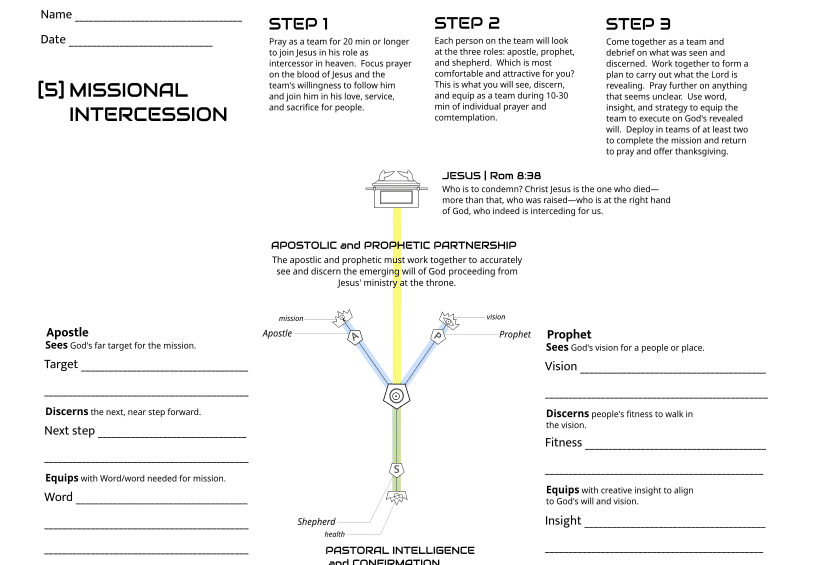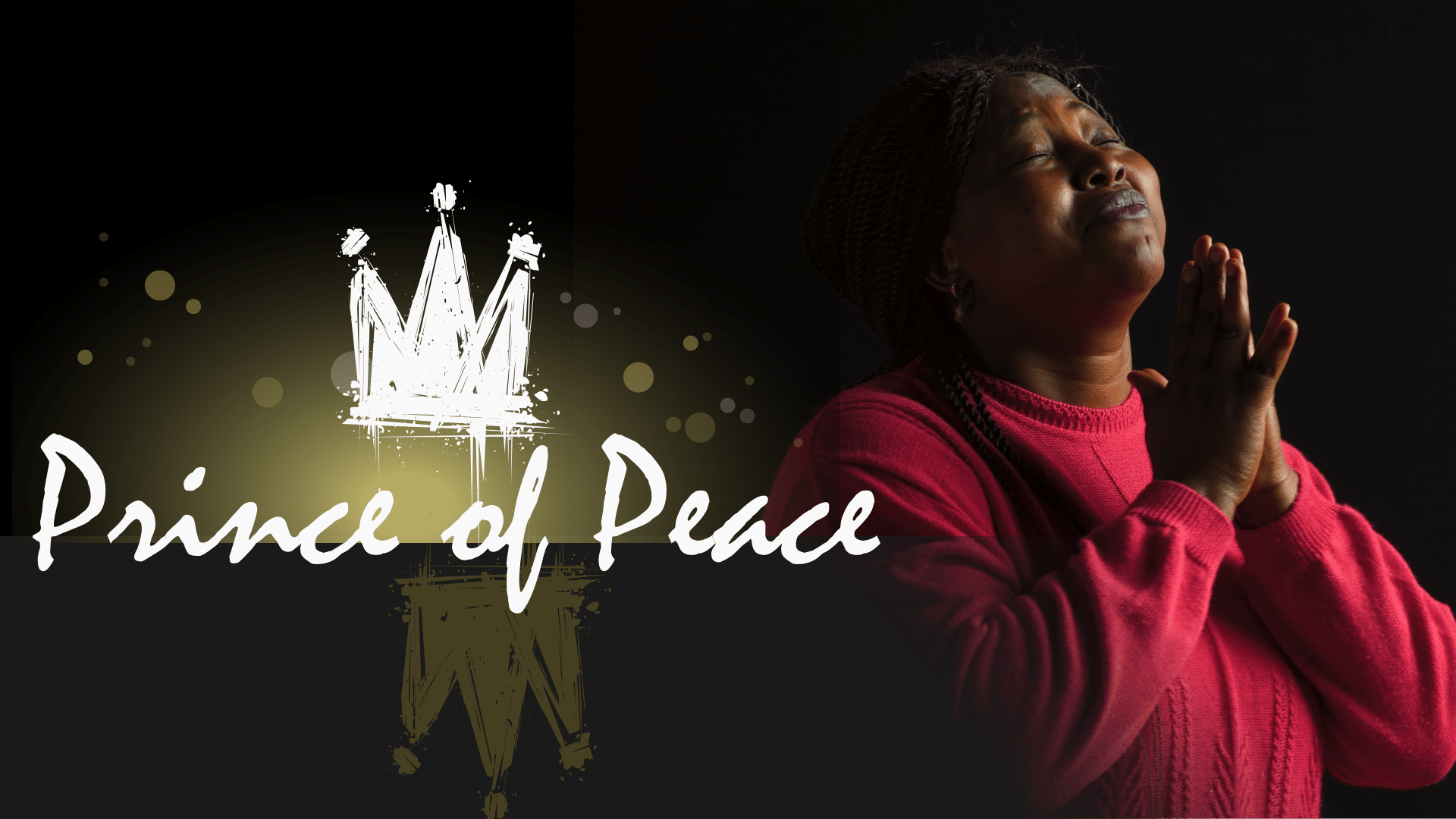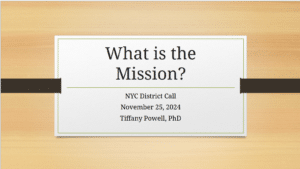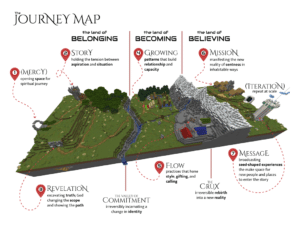Mercy Space
Mercy Space or “Mercy” is the first position on The Journey Map, though it is often “hidden” in that it’s something a person or group must do to create space for spiritual journey before others even arrive to walk together. Mercy Space is created in the hear and life of a disciple-maker before any disciple can connect on their spiritual journey. It is created in the life of a church, community, or core group before they can welcome others on the path of spiritual growth. In all cases, Mercy Space is about creating openness inwardly and outwardly for the Belonging of others to form and grow.
When Mercy Space is created, spiritual journeys happen and progress without external confusion or barriers and people feel like they Belong, first as their story connects to others, and then as they encounter the revelation of God that transforms their identity and mission. In our relationships, this means creating real space for the Spirit to work in the people we care about or are coming to care about. While the Spirit often uses humans, well-formed Mercy Space is an environment emptied of the work of man without God or his systems. Groups that create this space feel “open” in two ways: open to people as they are in their complete humanity, and open to God being present and moving in intimacy and holiness, Oneness and All-ness. Conversely, when Mercy Space is not present or under-developed, people are welcomed superficially into spiritual journeys that are disrupted by lack of authentic openness, lack of adequate space and support, lots of distractions, and eventual disappointment and wounding instead of belonging.
The E.L.E.V.A.T.I.O.N Allegory | E – Entrance
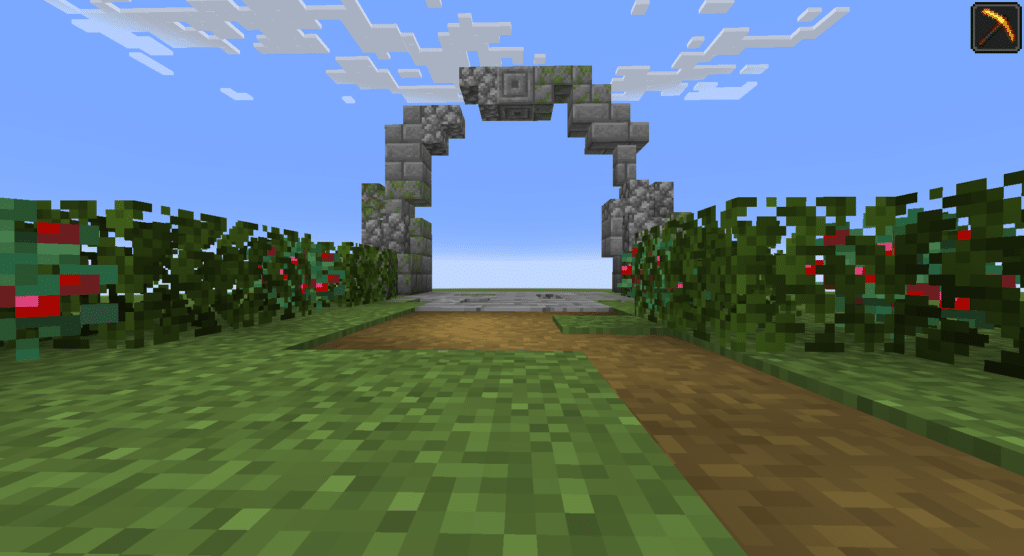
In the ELEVATION version of The Journey Map, the first position is E for Entrance, symbolized by the Old Portal. This is the “spawn point” create specifically for the adventurers to arrive at the Lowlands of Belonging and gather for their journey. Well worn, the portal feels familiar and safe, and while the trail at their feet seems simple, the creators of the portal intend for a transformational journey ahead. In fact, the creators of the portal have already mapped out the world and the journey of the adventurers in their own hearts and minds, and have readied themselves to support the journey till its end. Welcomed by such openness, the curious adventurers are eager to step out on the road of discovering each other and the lands ahead.
Dynamic Elements
The key dynamic element of the Mercy position in people’s spiritual journey is openness, specifically openness with a incarnational and intercessional nature. Incarnational means, like Jesus was God in flesh, we wish for the divine to be present in our humanity and the humanity of others. Intercessional means we are willing to take up the task of connecting God and humanity by carrying people before God and carrying Gods provision and revelation back to people.
- Openness must be practical: we must have time, space, energy, and resources available to create and support other’s spiritual journey.
- Openness requires cultivation: we must aggressively remove obstacles of hardness, shallowness, and distraction in our hearts and relationships.
- Openness is radical hospitality: we must be willing allow others to enter our lives, not just our space, and be willing to enter theirs, even though in both cases this will mean encountering mess.
- Openness grows from love: we must be willing to cherish, hold, and nurture people (rachum), love loyally (hesed), and show favor and kindness (hanan). (see OT meanings of mercy: רחום rachum; חֶסֶד hesed; חָנַן hanan)
Jesus and His Followers
Here are important ways we see Mercy Space in the Way of Jesus and his followers:
- The Five-Hundred Years of Silence: The OT closes and no prophet arose in Israel for 500 years before Jesus. This was a period of God “cultivating the time” in very broad socio-historical factors to create openness for the Messiah. Jesus connects to this when he announces his Gospel in Mark 1:14 “Now is the time, the Kingdom of God is at hand. Repent and believe the Good News.”
- Kenosis: Philippians 2:7 says that Jesus emptied himself of his equality with God in order to enter the servant role necessary to accomplish the Gospel. Jesus called people to empty themselves in order to pursue mission. Often this came in the form of leaving (fishing boats or tax booths) or in the form of radical giving, both of which could produced availability and simplicity.
- Come and See: Jesus spent time just being in the ministry of John. Before he ever recruited disciples from the fishing boat, he offered to hang out and share space (John 1:35-40).
- The Wedding in Cana: Even though the timing wasn’t right, Jesus submitted to his mother’s suggestion and saved a party as his first sign, showing hospitality and responsiveness to others (John 2:1-12).
- 40 Days of Cultivation: Jesus’ period of fasting in the wilderness was a cultivation of openness to Spirit and the mission ahead. When he faced the Enemy in the Three Temptations, he was able to demonstrate the environment within him that was ready for other’s spiritual journeys (Mathew 4:1-11).
- Un-preparing for the Journey: When Jesus sent out his followers, he instructed them to travel light to make space in their own journey for the humanity and hospitality of others (Luke 9:1-6).
- The Parable of the Soils: Jesus tells a parable about the condition of human hearts that is a key to all other parables and teachings because moral of the story is about openness and what must be cultivated (removed) in order to achieve it.
- Paul’s Speech at the Areopagus: Paul’s big point is about the prevenient mercy space of God demonstrated in a theology of place and even the deeper quest of the Stoics (prevenient is the idea that God works ahead of us to make things ready). This can be connected to the 500 Years of Silence for implications of interpreting prevenient mercy space in “region space-time”, or, to put it more simply, to see what God has been doing in a place and its history.
Mercy Space ToolKit
These resources, tools, and activities can be used to create and expand Mercy Space. Because Mercy Space “boots up” the entire Belonging phase in those initiating spiritual journey, many of these tools apply to the entire phase:
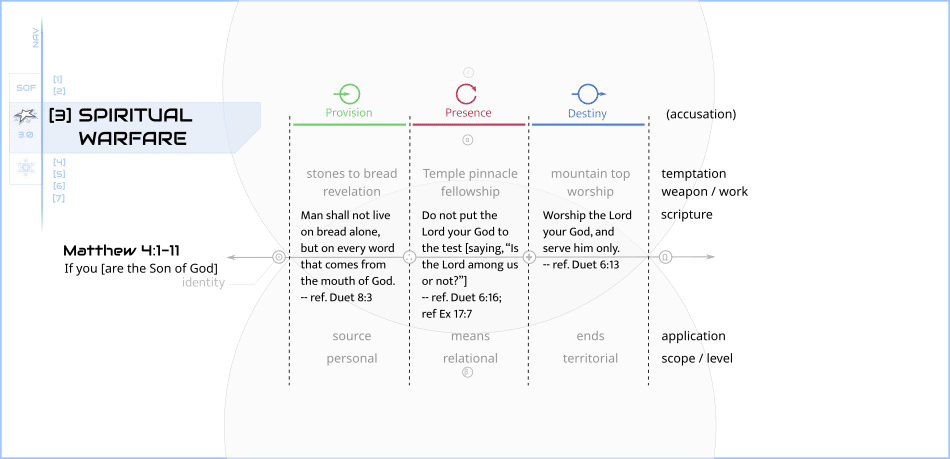
Spiritual Warfare is a framework to apply the Three Temptations to our own identity in relationship to ourselves, our relationships, and our territory/destiny. It’s a great tool for exploring internal Mercy Space and how ready we are to allow God to work to produce his redemptive movement in us. Best used with an experienced facilitator.

The Four Soils is a tool that applies Jesus’ parable to dynamics in individuals to create clarity on missional in intercessional readiness — making this a good tool to look at patterns of behavior that support or oppose Mercy Space. Best if used on a team or with a facilitator.
Ideas and Stories about The Story Zone
Articles and Resources to shape thinking for Mercy Space.

What Does it Mean to be Spirit-Led with Pastor Mark Perri
One small contribution I can make is to share story with you. This could be valuable in several ways: First,…
A Spirit-filled Christmas: The Joy in Judgement
The end of this week (Black Friday) marks the beginning of the Christmas season for many. (Though the big-box…
From Inner Peace to the Holiday Table
This is Session 2 of the Prince of Peace: Jesus and Peacebuilding from the Election to the Holidays webinar series….
Related Entries
Share:
Pain and Need Aren’t Partisan
This is Session 3 of the Prince of Peace: Jesus and Peacebuilding from the Election to the Holidays webinar series. (Click here to sign up for session invites.) Sometimes people seem so different from us, we automatically assume we can’t connect. Or, we tried to connect on some level, but it quickly became way too…
What is A Mission Statement?
On the LMC NYC District call this month, Dr. Tiffany shared critical information on what is and what is not a mission statement. This is critical as we think about moving the congregations in our district forward towards mission, optimize the mission already underway, and align together on the LMC mission as district churches. In…
Advent Calendar
Count Down the Days to Christmas with Camp! Jesus is the center of our Camp community. Let’s celebrate together the coming of the One who brings peace and salvation and life everlasting to humanity. We’ll be posting each day to Facebook and Instagram stories, but you can get our daily post in your email inbox!…
A Spirit-filled Christmas: The Joy in Judgement
The end of this week (Black Friday) marks the beginning of the Christmas season for many. (Though the big-box retailers had stuff out before Halloween, can you believe it!?!) For our culture, this season is a time of Joy. We gather for feasting and presents and the delighting of children. And despite the growing chill…
From Inner Peace to the Holiday Table
This is Session 2 of the Prince of Peace: Jesus and Peacebuilding from the Election to the Holidays webinar series. (Click here to sign up for session invites.) This session is about what we do when the people around us challenge our peace. It requires us to draw on something deeper in order to continue…
Releasing and Loving “The Other Side”
This is Session 1 of the Prince of Peace: Jesus and Peacebuilding from the Election to the Holidays webinar series. (Click here to sign up for session invites.) This session is about what we do with those in our lives who see things differently — even very differently. We do this using a paradigm from…
Story of A Tree
A fresh tree stump is like a magnet to me. I have to look at the rings to read the tree’s story. It’s at once humbling to look inside a living thing that is much longer-lived than yourself, but also encouraging to see how it weathered the ups and downs of life, the good times…
Camp’s Political Endorsement
I’ve been eligible to vote for 30 years, but – like many in my generation – I’ve never felt like a politician or party truly represented me. They may win me at one point, but they’ll loose me in the next. When I have voted, it always seemed I was going to the polls holding…
Prince of Peace
Camp’s mission statement says we offer people the opportunity to fellowship in “serenity”. Serenity literally means “clear skies” — a state of refuge from the storms of the World. Right now, our World does feel pretty stormy with a divided country going into an election and numerous disasters and conflicts abroad and at home. Because…
Mapping Spiritual Journey with NYC Leaders
In order to know where you’re going, it’s a good idea to know where you are. One of the best ways to know where you are is a good map. The NYC LMC District is seeing growth in many of our churches right now, and opportunities for re-inventing and re-launching in others. But these are…
- « Previous
- 1
- 2
- 3
- Next »

